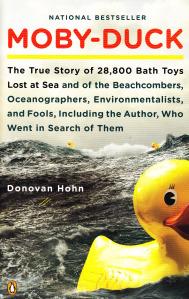 I remember the moment precisely. I was in Santa Barbara, California on a campus visit for Routledge. I stopped into the university bookstore to see which of our/their books were being used. From the cover of one of popular books in the general reading shelf stared a friendly yellow duck. My thoughts went, as they often do, to my daughter back home. The cover copy explained that this was the true tale of a bunch of “rubber” ducks lost at sea and the captivating story of how they ended up in diverse places. I bought it for my daughter since rubber duckies had been a kind of childhood theme, and when I saw it on her shelf recently I also grew curious again. I’ve always been fascinated by the sea, even applying for jobs at the Maine Maritime Academy just to be near the water (and in Maine).
I remember the moment precisely. I was in Santa Barbara, California on a campus visit for Routledge. I stopped into the university bookstore to see which of our/their books were being used. From the cover of one of popular books in the general reading shelf stared a friendly yellow duck. My thoughts went, as they often do, to my daughter back home. The cover copy explained that this was the true tale of a bunch of “rubber” ducks lost at sea and the captivating story of how they ended up in diverse places. I bought it for my daughter since rubber duckies had been a kind of childhood theme, and when I saw it on her shelf recently I also grew curious again. I’ve always been fascinated by the sea, even applying for jobs at the Maine Maritime Academy just to be near the water (and in Maine).
Of course I’m referring to Moby-Duck by Donovan Hohn. It wasn’t really as cute and cuddly a book as I thought it might be—that duck on the cover sure looks happy—but it was far more important. As Hohn explains, he was a teacher captivated by the story of a cargo container holding plastic (not rubber) bath toys falling into the Pacific Ocean on a crossing from Asia. The ducks (and frogs, turtles, and beavers) spread out as far as Alaska and points south on the west coast of the US, and some perhaps made it back east. Some were even reported in Maine (but Hohn came to doubt they are the right ones). So he set off on several ocean voyages to follow the trail of the toys. He has left us a moving and thoughtful memoir of the journey, and also much more.
The oceans are incredibly polluted. As Hohn points out at several points, entire cargo containers—sometimes several at a time—tumbling into the ocean and being left behind is not uncommon. Add to that the trash, particularly the plastic, that otherwise makes its way into the ocean, in some places forming islands of garbage so large that they can be spotted by satellites, and I begin to grow truly alarmed. Hohn learns about plastics and how toxic they might be, as well as how thoughtlessly they are hurled into the oceans. Not written as an environmental manifesto, Moby-Duck—literate, witty, and very human—nevertheless narrates how a father came to see the world through the eyes of parenthood. And some of what he finds is truly frightening. My takeaway? Little things matter. Immensely. That, and we need to clean up our act before it’s too late. No bath will wash away the stains we’re still in the process of creating.
